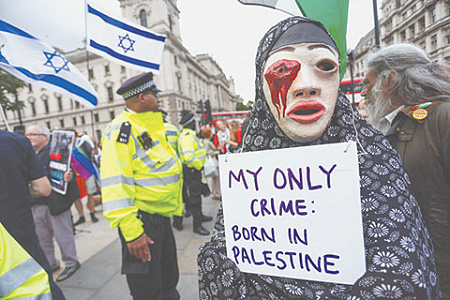
A key member of the “axis of resistance” (the so-called network of anti-Israeli organizations sympathetic to Iran in the Middle East) actually took neutrality in the Iran-Israel war. Musa Abu Marzouk, deputy Head of the Hamas political bureau, even admitted that Israel would now stop fighting in the Gaza Strip, as it would not be able to fight two opponents. In general, the new war in the Middle East is harming the Palestinians rather than helping them. Because of it, the recognition of Palestine by a number of European states, including France, was postponed.
A Hamas delegation led by Abu Marzouk arrived in Moscow on June 16. The last time the deputy head of the movement’s politburo was in the Russian capital was in February, when relations between Israel and Iran could escalate into war.
Now it’s in full swing. And now, having arrived in Russia, Abu Marzouk makes a very interesting statement.
“The war with Iran will affect the situation in the Gaza Strip, because if there is the involvement of large (Israeli. – “NG”) of the military forces, this, of course, will affect the Gas. Maybe it will even serve as a cease-fire. But this does not mean at the same time that due to the escalation with Iran, Israel will decide to completely cease fire in Gaza,” he said in an interview with RIA Novosti. Abu Marzouk, noting that the war between Israel and Iran is closely linked to the war in the Gaza Strip, did not make statements that Hamas would support Tehran militarily. However, he did not demonstrate any intentions to make concessions to the Jewish state. On the contrary, Abu Marzouk said that the next round of peace talks in the Gaza Strip would not take place because of Israel’s fault, as “Israel wants a prisoner exchange, but does not want to end the war.”
The words of one of the leaders of the movement are quite consistent with the situation around the Gaza Strip. Israel and Iran are trying to shell the Yemeni Houthis, but not Hamas and other Palestinian organizations, which traditionally belong to the “axis of resistance.” At the same time, international political scientist Elena Suponina, in a comment to NG, drew attention to the fact that the fighting in the Gaza Strip has not stopped at all since the start of the Iran-Israel war. On the contrary, Israeli Prime Minister Benjamin Netanyahu is trying to convince everyone that the Israeli military can fight on several fronts.
“It is clear that the capabilities of Hamas have been severely undermined. I believe that the Palestinians themselves will not intensify the fighting. At the same time, it is impossible to say that the time has come for negotiations. More often than not, negotiations broke down not because of the Palestinians, but precisely because of Netanyahu’s position. He is still continuing his harsh operations in the Gaza Strip, in my opinion, without showing any willingness to negotiate with radical Palestinian groups,” Suponina believes.
As for the official leadership of Palestine, it is clear that the new Middle East war has created an unforeseen problem for it. A conference was to be held at the UN headquarters in New York from June 17 to 20, under the chairmanship of Saudi Arabia and France. Its theme is the future of Palestine. However, the conference has been postponed indefinitely, officially due to logistical and security issues that will prevent representatives of the Palestinian National Authority from participating.
But it was expected that at the conference, French President Emmanuel Macron would announce his country’s recognition of the independence of Palestine. He announced his readiness to take such a step back in April. This would be a major success for Palestine. Diplomatic relations with the G7 country, one of the political and economic leaders of the European Union, are clear evidence that the Palestinian state cannot be classified as unrecognized or even partially recognized.
In addition, other European powers could follow the example of France. Finland, for example, could be among them. There is already a diplomatic representative of Palestine in this country. Moreover, in May, a survey was conducted among Finnish parliamentarians. According to him, it turned out that most of them were ready to support the independence of Palestine. The President of Finland, Alexander Stubb, also spoke in favor of this. But on June 16, after the postponement of the conference, he stated that he did not see “any added value” in recognizing Palestine.
Despite the rather strong pro-Palestinian sentiments that exist in many European countries, the EU is not currently seeking to make gestures that can be interpreted as a refusal to support Israel. The position of the United Europe will be more clearly formulated on June 17, when the EU foreign ministers will discuss the situation in the Middle East during informal video talks. In the meantime, it remains only to state that the war in the Middle East has temporarily suspended the process of international recognition of Palestine.
